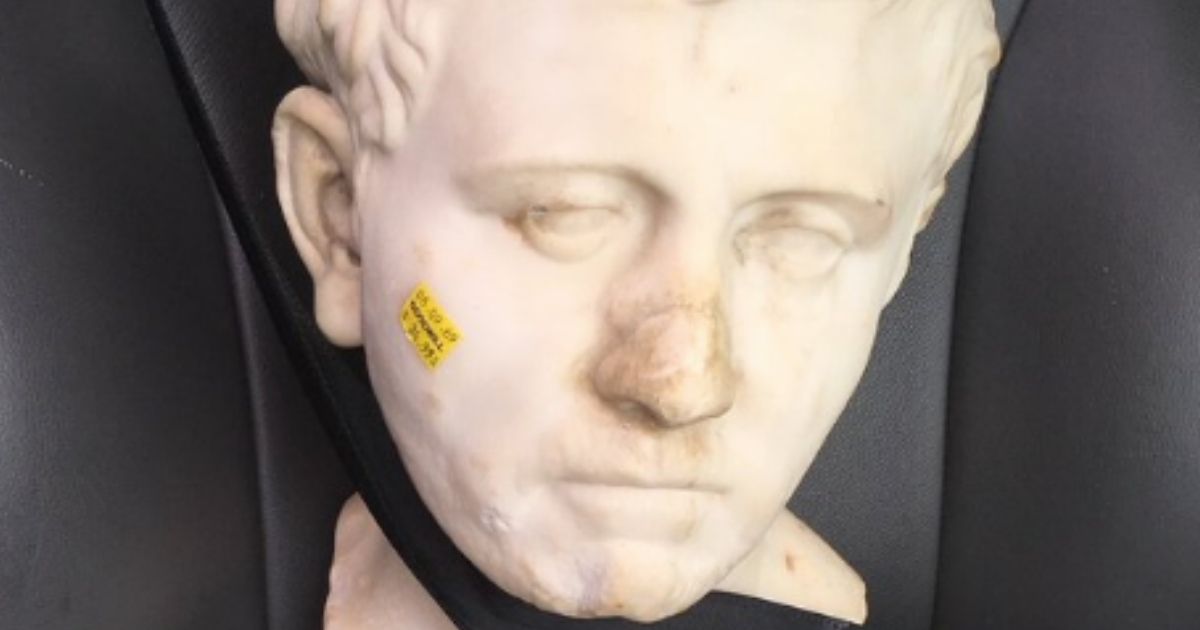Have you ever hoped to make a major find at a garage sale or a thrift store? Well, one Texas woman, who is always on the lookout for such things, found the deal of a lifetime, and now her story can finally be told.
In 2018, Laura Young went into a Goodwill in Austin, Texas, “hoping to find something cool.” She bought a marble bust for $35 — a price that may have seemed rather high for a thrift store item. But it turned out that her $35 went toward recovering a lost treasure that would send her on a three-year adventure.
A marble bust was sold for $34.99 at a Goodwill store in Austin, Texas, in 2018. Turns out, it was an actual Roman bust from the late 1st century BC or early 1st century AD.
How it got to Texas remains a mystery.https://t.co/qo1UYzQ9wx
— The New York Times (@nytimes) May 6, 2022
Young, an antiques dealer and collector, said she was very taken with the bust and thought it was extremely well-made.
But when she walked out of the store and saw the bust in the bright Texas sun, she suddenly began to think she had something far more than a nicely turned replica.
According to the BBC, Young went home and began googling images of Roman-era busts. And what she had sitting next to her looked so much like a real, 2,000-year-old masterpiece that she just couldn’t get over it.
Young quickly began making inquiries among historians, museums and high-end antiques dealers — and what she discovered floored her.
Her $35 thrift store buy turned out to be a 2,000-year-old Roman sculpture made between the first and second centuries A.D.
One expert determined that the bust likely depicts Sextus Pompey, a Roman general who opposed Julius Caesar.
“I’m not even sure how it’s possible to put a meaningful monetary value on something that has such an important history, but on the other hand could never, ever be sold,” said Lynley McAlpine, a spokeswoman for the San Antonio Museum of Art, the BBC added.
Young and her compatriots have spent several years tracing the history of the bust to try and learn how it got from first-century Rome to a thrift store in Austin, Texas. And it appears that the bust may have come from a museum in Bavaria, Germany.
According to art sleuths, the bust likely came from the Pompejanum art and cultural museum in Aschaffenburg, a town near Frankfurt, Germany.
The Pompejanum is a replica Roman villa built in the 1840s by King Ludwig I and filled with both real and replica Roman art. It was meant to serve as a public museum for Germans to study ancient Roman culture.
One expert feels that the bust of Sextus Pompey sat in the Pompejanum for decades until looters descended on the museum in World War II. It is likely that a U.S. soldier came upon the item during the liberation of Germany and somehow sent it home to the States. But that is only conjecture, as there is no clear evidence revealing how the bust came to America.
With all this history mounting, Young ultimately decided that she did not want to profit from wartime looting. And since it is a priceless piece of history, she has loaned it to the San Antonio Museum of Art, which will finish the negotiations for returning it to the rebuilt Pompejanum.
The reason we are all just learning about this amazing story is logical. The provenance tracking and museum negotiations took several years and while they were ongoing, Young just had the bust adorning her living room.
“He looked very nice. And he was just there staring at us for three-plus years,” Young said.
But it was smart not to let the world know that a priceless Roman artifact was casually sitting in the living room of a woman in Austin, Texas!
In the end, Young said that this will probably rank as her most amazing find ever. “Even if I found something more valuable and was able to actually sell it and make that profit, he would still probably be the best thing.”
The bust will sit in the San Antonio Museum of Art until next year when it will then be returned to the Pompejanum.
This amazing story shows once again that God works in mysterious ways.
This gift from God gave a woman in Texas the opportunity to show that integrity trumps greed and that she could rise above a wish for riches. Instead, she found it in her heart to return a priceless piece of art to its rightful owners without compensation. She just did so because it’s the right thing to do.
This article appeared originally on The Western Journal.

























 Continue with Google
Continue with Google